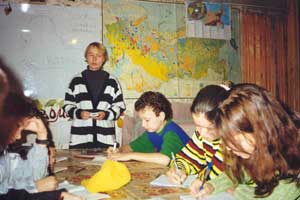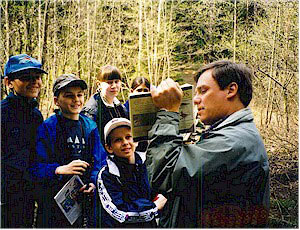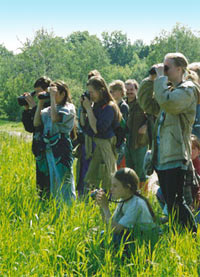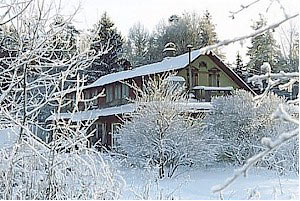|
| Our Field Ecology Center published more than
180 methodical materials for nature studies. Some of them are in English: |
|
|
|
Field Ecology Education in Russia
The Main Trends of the Environmental education in Russia.
by Alexander S. Bogolubov
Russia has recently become a state of the "general ecologization". Moreover
the importance of this sphere of human knowledge and the necessity of the environmental
education are admitted by everybody including teachers and ministers. The final aim of the
environmental education is the formation of a "healthy environment community"
that lives in harmony with nature. Mixing concepts, terms and theories gives a negative
phenomenon - representatives of different trends can not speak the same language in spite
of the only and identical aim - educating a generation of people who would thinks
"ecologically" (in an environment way).
 The analysis of the environmental education in
Russian Federation for the last 10 years helps to come to the conclusion that the
environmental education includes at least 5 trends: "school (theoretical)
ecology", "technical (industrial) ecology", "socio-political
ecology", "playing ecology", "field ecology". The present
classification is rather symbolic and thus we may speak of different ecology, using these
word-combinations only in quotation marks and bearing in mind that we don't speak of
ecology as a science but only of some trends of the environmental education. The analysis of the environmental education in
Russian Federation for the last 10 years helps to come to the conclusion that the
environmental education includes at least 5 trends: "school (theoretical)
ecology", "technical (industrial) ecology", "socio-political
ecology", "playing ecology", "field ecology". The present
classification is rather symbolic and thus we may speak of different ecology, using these
word-combinations only in quotation marks and bearing in mind that we don't speak of
ecology as a science but only of some trends of the environmental education.
All these trends are characterized by different approaches to the education of
children, a quite different substance forms of work and direct ways of communication with
children. Moreover, each of these trends has got its own authors, its own means of
communication and its own audience.
The "school (theoretical) ecology trend of the environmental education" is
mainly based on studying general environment objective laws and global environmental
problems. Textbooks that educators use in their teaching are written in a very
"dull" and "global" manner.
The "technical" trend in the environment education is based on studying the
results of the industrial influence on the environment and the ways of struggle with
pollution by various technical means. As a part of professional education this sphere is
certainly very important but is not the main one in forming a correct attitude of a person
to the Nature.
The "sociopolitical" ecology is nature preservation through the adoption of
"Reduce-Reuse-Recycle" philosophy, and its implementation in industry and
everyday life. This trend though spreading quickly throughout the country is inefficient
because it causes fear for the future and a social tensions as a result of searching for
scapegoats. Positive aspect sociopolitical ecology is that many people start to
support the idea of preserving nature and thus can attract the attention of "powerful
people of the world" to the ecological problems.
The "playing" trend in education is something new for our country and is
spreading fast among educators (especially in schools). Any game including an ecological
one is a fine occupation for children that aids to their maturity and an easy way of
acquiring useful knowledge for adults. A foreign influence in this field contributes to an
active development of the "playing" ecology in our country as our foreign
colleagues have gained an enormous experience for many years and it is deprived of
national peculiarities and need only a translation.
 Nowadays the sphere of the
"field" ecology turned out to be a less developed and less simple form of the
environmental education in Russia. And it is quite evident: the teachers who have got a
special natural sciences education are engaged in the sphere of the "school"
ecology. The former engineers and educators of technical colleges are engaged in the
"technical" ecology. Everybody can be engaged in the "socio-political"
and "playing" ecology including former active members of youth communist
movement. But everything mentioned above is insufficient for a "field" ecology
educator. The person must combine the qualities of a scientist, an outdoor guide and an
entrepreneur to successfully teach "field" ecology. Nowadays the sphere of the
"field" ecology turned out to be a less developed and less simple form of the
environmental education in Russia. And it is quite evident: the teachers who have got a
special natural sciences education are engaged in the sphere of the "school"
ecology. The former engineers and educators of technical colleges are engaged in the
"technical" ecology. Everybody can be engaged in the "socio-political"
and "playing" ecology including former active members of youth communist
movement. But everything mentioned above is insufficient for a "field" ecology
educator. The person must combine the qualities of a scientist, an outdoor guide and an
entrepreneur to successfully teach "field" ecology.
The Field Ecology and a Naturalistic Approach in Russian Education
The term "field ecology" is not generally accepted in the Russian
environmental education and was introduced into the educational practice by us
(Association "Ecosystem") in the early 90s. By "field ecology" we mean
the forms and methods of the environmental education that help students to investigate
nature through real nature objects - animals, plants, nature communities (ecosystems) in
their natural form of existence. This approach predetermines that the main forms of
children's education are outdoor lessons - excursions, a "field" practices,
outdoor lessons, expeditions. Our approach is not new, it has existed in various forms for
many years for example in the sphere of the additional (out-of-school) education. In this
aspect our country has no analogies in the world, nowhere but in Russia there is such a
broad scale state system of the environment (eco-biological) education that is based on
the out-of-school work.
 The
"naturalistic" approach in teaching biology and educating children was used in
the first years of the Soviet period. "The Biostation for young naturalists" was
founded in Moscow in 1918 and young naturalist movement started at the same time. Such
educators as B.V.Vsesvyatsky and P.P.Smolin stood at the roots of it. They could unite an
inborn children's aspiration for the study of nature and scientists' possibilities in
investigating nature. One of the founders of the Russian young naturalist movement and the
"author" of the naturalistic approach in the Russian out-of-school education
P.P.Smolin attributed the success of the young naturalist movement by a close contact of
children with nature and an investigative approach in their studies of nature. The first
Russian young naturalist groups were naturalistic in the full meaning of the word -
children lived, studied in nature (lessons in the woods), and carried out research work in
the woods on the specially arranged areas (camps). The first experience of combining
studies and original research work in nature proved to be successful and began to extend
fast throughout the country. The
"naturalistic" approach in teaching biology and educating children was used in
the first years of the Soviet period. "The Biostation for young naturalists" was
founded in Moscow in 1918 and young naturalist movement started at the same time. Such
educators as B.V.Vsesvyatsky and P.P.Smolin stood at the roots of it. They could unite an
inborn children's aspiration for the study of nature and scientists' possibilities in
investigating nature. One of the founders of the Russian young naturalist movement and the
"author" of the naturalistic approach in the Russian out-of-school education
P.P.Smolin attributed the success of the young naturalist movement by a close contact of
children with nature and an investigative approach in their studies of nature. The first
Russian young naturalist groups were naturalistic in the full meaning of the word -
children lived, studied in nature (lessons in the woods), and carried out research work in
the woods on the specially arranged areas (camps). The first experience of combining
studies and original research work in nature proved to be successful and began to extend
fast throughout the country.
In the 1930s the naturalistic approach was changed into the "socialistic"
one, i.e. it was necessary to develop agriculture, "to overtake and leave somebody or
something behind". The young naturalist movement was combined with the pioneer
movement and had lost its unique character for many years. Only few enthusiasts kept
developing naturalistic approach. They founded a network of "naturalistic"
groups of children in Moscow that continue to exist up to nowadays. They are "The
Club of Young Zoo-Friends" and "The Biology Club". Second one was a branch
of All-Russian Society for Nature Preservation and later and up to now - of the State
Darwin Museum. "The Biology Club" is also a branch of the Moscow Society of
Nature Investigators. After the Second World War the young naturalist movement spread all
over the country - the "stations for young naturalists" began to appear
everywhere . It's a pity but they were characterized by an "agricultural"
approach though there had been a tendency to increasing the number of groups of the
naturalistic approach since 1970s.
 In the late 1980s and early 1990s there appeared a
real boom of the naturalistic approach that coincided with the disappearing of the
agricultural one. By that time the social idea of man's place and role in nature had
changed greatly - the appeal for conquering nature had been replaced by one for preserving
it. The regeneration of the roots of the environmental education coincided with the
"changing course" of the whole country and falling into an economic decay - all
these events were reflected in shattering the establishments of the additional education.
At the same time there appeared an important problem of looking for ways of attracting
young generation's attention to investigating and preserving the Nature. In the late 1980s and early 1990s there appeared a
real boom of the naturalistic approach that coincided with the disappearing of the
agricultural one. By that time the social idea of man's place and role in nature had
changed greatly - the appeal for conquering nature had been replaced by one for preserving
it. The regeneration of the roots of the environmental education coincided with the
"changing course" of the whole country and falling into an economic decay - all
these events were reflected in shattering the establishments of the additional education.
At the same time there appeared an important problem of looking for ways of attracting
young generation's attention to investigating and preserving the Nature.
The idea was not a simple one to implement. First, for many years of the pioneer
domination in the young naturalist movement the educational culture itself and the ways of
the environmental education of children had been lost. Second, young biology teacher
succeeded naturalistic biologists of the "old school". These new educators
studied biology and geography only through books, they didn't know real nature and some of
them never took part in the field work (owing to various circumstances). The third reason
for this was a rapid development of ecological science, nature-preservation methods and
monitoring research. Research methods had made a great progress but almost nobody tried to
put them into the educational practice. Fourth, the early 1990s were marked by a great
deal of foreign influence in the environmental education that was showered on
"unprepared heads" of Russian environment teachers.  An insufficient development of a
"naturalistic" trend in the Russian environmental education can finally be
explained by these factors. The last reason had played a very important role in the
present correlation of trends of the environmental education. An insufficient development of a
"naturalistic" trend in the Russian environmental education can finally be
explained by these factors. The last reason had played a very important role in the
present correlation of trends of the environmental education.
All-Russian Environmental Educational Association
"ECOSYSTEM" started its work in 1995. It is one of the first educational
organizations that teaches "naturalistic" ecology to school children.
"Ecosystem's" ultimate goal is to introduce "naturalistic" ecology
into school environmental education. "Ecosystem's" Field
Center helps to reach this goal through a variety of outdoor ecology courses.
|







